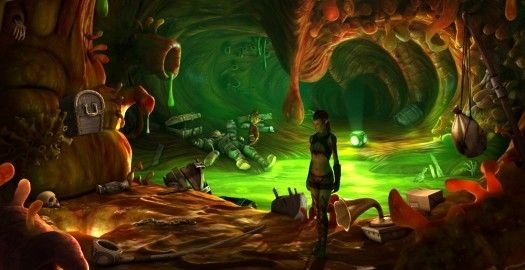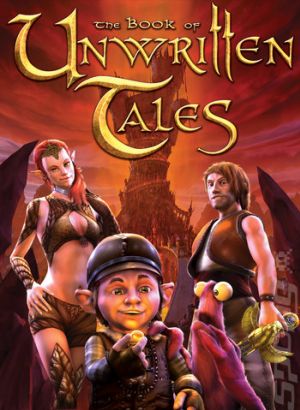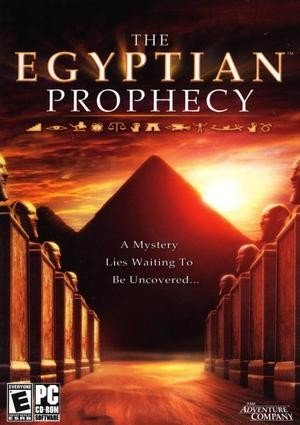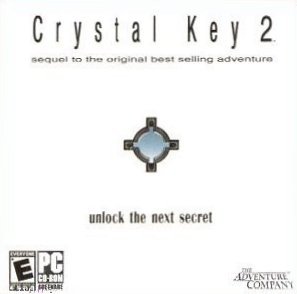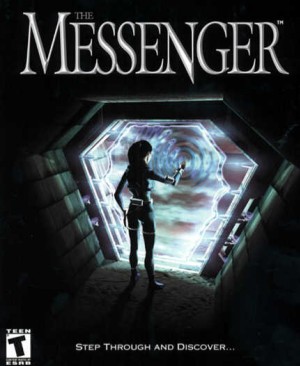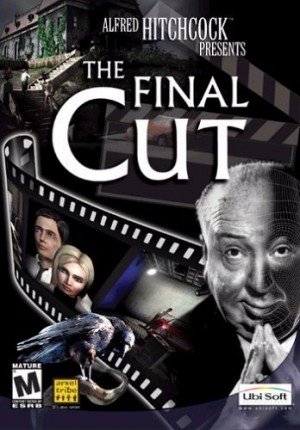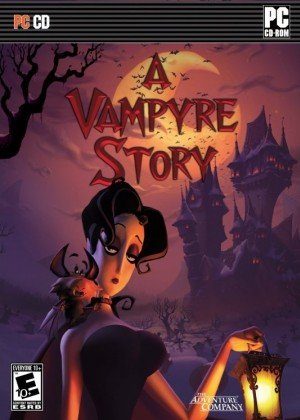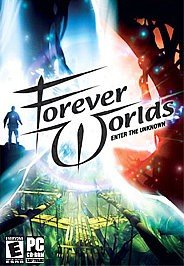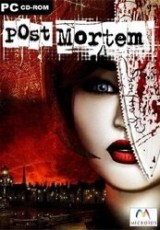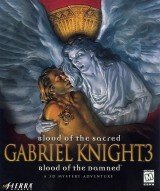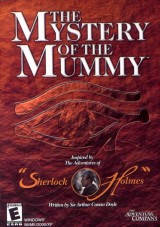Review for The Book of Unwritten Tales
Game information
Adventure Gamers Awards
We have waited literally years for the English version of KING Art Games' The Book of Unwritten Tales. Now it's here, and YES, the heroics match the hype! A spoof/tribute to popular fantasy works, this game returns us to the heyday of 'questing' in an epic adventure over the course of 15-20 hours. The action shifts from the modest village of Seastone to a lost island to the mother of all villains’ dusty badlands domain, even as it forges an unexpected alliance of four unlikely heroes who must set aside their personal agendas and prejudices to work together for the greater good. Yet the tale is always simple enough to follow, focusing on characters and solving a dragon's loot worth of puzzles, regaling players with line after cheeky line delivered with impeccable wit along the way. The vibrant canvas of warmly-familiar locales is exquisite, the music frequently heaps on the nostalgia, hundreds of little animations and sound effects bring the surreal world to life, and all characters are endowed with unique and memorable personalities, investing you as deeply in their pedestrian concerns as in the big picture. There aren’t hours of clueless wandering masquerading as 'play time' either, as the quests flow seamlessly from one to the next, challenging but never frustrating. Though a slightly-abrupt finale sets up for a sequel instead of tightly closing the case, you’re nevertheless sure to be entertained for many hours by this attractive, funny game and its charming cast.
A prelude segment involving the elven Princess Ivo trying to rescue Yoda-esque gremlin Mortimer MacGuffin is designed as a gameplay tutorial, easing into the story without an overload of exposition. We get the point quickly: a book with the location of the Artefact of Divine Power – an amulet that gives its possessors all that they desire – and a special ring must be delivered to the Arch-Mage in Seastone. While Ivo manages the book, the responsibility of the ring falls on young gnome Wilbur Weathervane, who's interning as a bus-boy in a dwarven pub and nursing a secret ambition to become a mage. Wilbur's momentous trip to Seastone, his first to a human settlement, starts the adventure in earnest. After many quests that showcase his super-adaptability, he earns a Mage Diploma and finally crosses paths with Ivo, along with the awesome twosome of Nate and Critter, a shady airship pilot and his pet who are held hostage by heavy-duty orcish bounty hunter Ma'Zaz for assorted contract violations. Circumstantially thrust together, but also united as a team committed to the good fight, the fantastic four leave no doors shut and no stones unturned in the race to retrieve the amulet before the evil Shadow Army.
If that sounds familiar, it's because it is. The unwritten tale is oft-told but evergreen, and it's with joy, not disdain, that you embrace its concepts and characters. Nate is a rakish mix of Han Solo and Guybrush Threepwood – he talks like the former, dresses like the latter, and swaggers like both. At the outset, he is all about gold, not glory, but is persuaded to cooperate by the no-nonsense Ivo. Elegant and arrogant, she pointedly (and repeatedly) rebuffs Nate's chauvinistic advances, but is friendly and protective towards Wilbur, though she tempers her affection with brusqueness. The little gnome is the biggest surprise: wide-eyed yet practical (when he sees a floating houseplant, his first thought is how easy it'd be to clean around it), Wilbur steals the show with his innocence, loyalty and fierce determination in the face of tremendous odds, and brings on the big laughs with his literalness – his consternation at the 'hairy demon' in the backroom of a tavern is absolutely hilarious. As for Critter, it's a revelation how a perky purple plushie is a perfect replica of a seven foot tall cranky Wookiee. All are playable at times, and each protagonist has strengths and weaknesses that can create or resolve problems accordingly. Nate is strong and unapologetically unscrupulous (it's vicariously amusing to watch him con some cons), while straight-laced Wilbur can set traps, crawl into cramped places, and crack technical manuals. Ivo is sexy, but she prefers to utilize her intelligence and agility instead.
Fortunately, the developers didn’t sit back after casting their leads; each supporting character is fleshed out with backstories that explain their current circumstances and behaviour. Some excellent cameos include Munkus the assistant villain, Wilbur's ex-military ("Call me Colonel!") grandfather who preps him for his trip to Seastone, a rag-tag mummy in MacGuffin's study, a helpful supervillain titled the 'King of Thieves', a two-headed ogre with a literally split personality, a pansy paladin in pink, a judicious orcish Chieftain, a doped-out bull shaman named 'The Rainmaker', and Ma'Zaz, who has more game than Boba Fett himself. This motley crew sprinkles a unique charisma on the game and adds considerable emotional depth to it; you'll find yourself actually caring about some of them, and missing all of them sooner or later.
The adventure is spaced over five lengthy, multi-part chapters. Each screen has several hotspots, some necessary, others simply adding ambience. Each hotspot has a basic level of explanation and a second that’s more detailed. The space bar reveals all available hotspots, and exhausted objects become inactive after use. The inventory is accessed by rolling the mouse over the bottom edge of the screen. Items can be combined, and though you can’t always tell what combinations will work, a visual cursor cue easily eliminates many that will not, both in the inventory and the natural environments, avoiding many unnecessary clicks. Objects and areas are activated based on quests, making it important to revisit scenes to check for new leads, though that isn't as cumbersome as it sounds since your agenda is always reasonably clear. And whenever a chapter requires extensive exploration, a map is provided which allows teleportation between all active locations. Characters don't run, but except for the sauntering Nate, they move quickly enough to not hold up proceedings, and double-clicking exits fades immediately to the next area. The game clocks the hours played, provides unlimited save slots, and like its RPG inspirations, even has an auto-save that resumes from the point of your last activity in case of an unexpected end.
Usually the leads have to collect items by hook or crook, then use them elsewhere to solve problems. Objects can't be combined without explicit reason, however, even if you get the pairing correct by trial-and-error. The overall flow of the game is fairly linear, with one to three active objectives at any point, but the relentless flow of quests keeps you constantly busy – there is always something to do. The to-do lists, despite the oddity of the items involved, are extremely rational, which may make them appear less challenging than they actually are, because great care has been taken to not frustrate with mindlessly zany obstacles. A handful of discrete puzzles are attached to inventory- and dialogue-based quests as well. A Wheel of Fortune guessing game is especially intricate, given the way its colours must be deduced. A dancing minigame has you pounding the keyboard while Nate does the Macarena onscreen and may take a while to master, while a devilish potion-making puzzle is sure to create quite a stir. Some tasks require dialogue to be chosen correctly, which can be solved by guesswork, but are more fun to logically work out.
Midway through the game, the protagonists begin to be grouped into teams of two or three on occasion. You control the characters simultaneously on such occasions, switching between them by clicking their onscreen icons. This adds complexity to the gameplay, since you must now choose the character best suited to handle a particular situation. Partnered characters can give each other inventory items and advice, and the rotation of quests between them is clever and continuous, though most impressive are the moments when they come together as a team to perform a single dramatic task.
The Book of Unwritten Tales is a treasury of gaming and pop culture in-jokes, and is proud enough of its heritage to smash through the fourth wall without a Helmet of Power. We have the 'Federation of Programmers' going public with their undead status, Wilbur having an off-camera mini-adventure in the gullet of something, Nate smugly acting all-knowing about the way quests will pan out (only to have the game mischievously twist situations around), some initially pleasant surprises morphing into full-fledged quests via a rip in the time-space continuum, and a lengthy segment involving two RPG players stressing about virtual to-dos like filing taxes and applying for rent subsidies (er… those sound horribly like real life adventures!) and back-room server troubles – all of which is absurdly exhilarating. The game chomps through players who prefer the 'wittier' dialogue choices: when asked how he spews such drivel, Nate answers that even he's not sure why despite multiple options, the most stupid one is always chosen. No one is spared: wine snobs, metrosexuals, casual dopers, intellectuals, red-tape-ridden officials, armed forces personnel, knights, and nerds. Everyone gets their due even as the tributes pile up, including (but in no way limited to): the Ark in a crate in MacGuffin's study, Grandpa Weathervane naming Wilbur's ring 'precioussss', the absence of Arcanite in a vein of copper, the whole kit-and-caboodle of the Warrior Set (a bickering trio of helmet, shield and sword), a rubber chicken (minus the pulley), and Nate's bizarre mana potion upgrades.
An homage like The Book of Unwritten Tales can fail miserably if the razor-wire between being 'inspired' and 'derivative' isn't treaded with the utmost skill. It's essential to not end up as a mere leech of past greats, but instead offering something awesome of your own. Great news: here's a game that ribs the genre but respects its elders; it laughs at itself but is sharp and serious about its business. It stays well outside the dusty carton of wannabe-cool games with its thoroughly entertaining, deceptively sophisticated script. It keeps the story simple, arguing that the conflict between good and evil can never be cliché, and chooses to focus on its characters and their minute-to-minute activities and dilemmas. Each task, tedious or glorious, is linked rationally to the story; no character behaves… well, out of character without sincere justification; and seemingly offhand comments tie up sub-plots many hours later, such as the eventual fate of a rat in the dwarven pub or the dragon Ivo rides at the start. Dialogues are crisp and witty, exposition is kept to an essential minimum, and no time is wasted in getting to the point in any situation. The script isn't a laugh-fest of slapstick comedy, nor is the cast blatantly hilarious. Its charm is the elegance with which it incorporates the snickers into each scene and sentence, making you grin (and often laugh out loud) all through. There doesn't appear to be much, if anything, lost in translation either; none of the quips misfire at a linguistic level.
Production values also allow little need to complain: a few spelling mistakes, occasional sub-par animation like the 'speaking' of the dragon which looks like it's chewing cud, slight glitches with sound and visual pixellation, especially in the final movie and credits. But these are notable only because from the outset we're treated to an outstanding quality of art, animation, music, script and voice acting. The backdrops, whimsically styled along the lines of earlier classic fantasy adventures, are, in a word, fabulous. The vibrant palettes make each warmly-familiar setting, be it a swamped ghost ship, an Atlantean undersea temple illuminated by bioluminescent jellyglowfish, or the swanky antechamber of the Arch-Mage, a visual delight. Richly textured with light and shadow, painstakingly detailed but never cluttered, the screens allow both left-right and front-back movement. Some screens scroll sideways, so it's imperative to scope out the total playable area of each location. Variety is added to the layout via some unusual perspectives, like the top-down view of a magician's study and the isometric RPG-like tunnels of the earth-pixies' mine. The art is also linked tightly to the gameplay – if you exit midway while rotating discs for a pattern-matching game, the order you’ve set is visible as part of the background scenery.
The second level of visual excellence is added by believable character animation: the protagonists move naturally and with ease, whether crossing acid pools on barrels, recoiling from nasty surprises, or just wasting time lounging around idly. Many have personalised gestures, like Nate's ‘I'm so down with it!’ finger zap and Wilbur's childlike expression of joy at the small pleasures of life, like his mechanical flying fish taking off. Ambient animation includes softly swirling ash when a funeral urn is opened, a rat slinking into its hole when someone walks past, a startling 'server crash', and some disastrous outcomes of poorly-set traps. Tribute scenes, like one which mimics Princess Leia's first holographic message for Obi-Wan, are delightfully executed. The cutscenes between chapters are also well-choreographed: the cinematic of Ivo jumping off a flying dragon is spectacular, and once again Wilbur succeeds at mission: impossible with a close-up action sequence all his own.
The graphics are expertly supported by a superb background score, which salutes the usual suspects – Star Wars and Indiana Jones themes – while playing situation-specific tracks like Egyptian music in archeologist MacGuffin's study and the Psycho theme during a peculiarly disturbing scene. Sound effects enliven the world with background events like crackling fires, hissing steam and howling winds, as well as character-related noises like Ivo's pet bird's R2D2-like tweets and the wheezing of asthmatic trans-fat maggots. A cheerful flourish even signals the achievement of each key set of objectives.
Expert voice acting rounds off the superlative production. Every character has a distinct and fitting vocal presence – each one eerily sounds exactly the way you'd expect them to! Ivo's formal but pleasant diction suits her reserved character well and Nate's hero-drawl is spot on (his profanity-laced rant at the most unlikely 'villains' of the game deserves an honourable mention) except in a few strident patches, but most fascinating is Wilbur's earthy Welsh accent, unusual yet endearing. The supporting cast has some remarkable performances too: Esther the body-less head is sweet and girlie, the earth-pixies have evolved the word 'wuuzaa' into a full language, Critter proves that you don't need to be coherent to be understood, Ma'Zaz's stout speech matches her stout form, and the mummy probably wouldn't be half as memorable if he spoke any other way.
By the time a very familiar symphony plays while the credits roll against a slideshow of concept artwork, you're sure to be misty-eyed, and not just from staring at the screen for twenty-odd hours. The (relatively) short fifth chapter ends with talk of a sequel, which is fair given the inconclusive finale, but only one adventure with this crew is far too few in any case. As pontificated by Cap'n Nate, life is about the journey, and it's true for this game: while the team does have a grand, all-encompassing ambition – keep precious artefact from evil witch while stayin' alive – it's more about the tiny, wobbly steps they take as they visit places they've never heard of and collaborate with people they don't like, to eventually discover strengths of character they never imagined they had. So don't be surprised if you find yourself mentally cheering when young Wilbur defies societal expectations to become a mage instead of the technogeek he's hereditarily ordained to be; when Critter stuns you with his competence and boneless resilience; as Ivo abandons her centuries-old prejudice against lower races like the humans as well as her deep aversion towards her unkempt teammate; or even as Nate realises that some (well, a very few) things aren't about profit. But we're never bogged down in the nobleness of the big idea that "it's nice to be good": our heroes aren't shy about quick cons or sly jibes, and remain fallible within their personal weaknesses.
At nearly 4GB, The Book of Unwritten Tales isn't small in size or scope, and provides a huge amount of entertainment from start to end. It's funny but intelligent; quirky but endearing; casual but carefully so; and deliciously familiar but not stale. It makes sure the jokes stay cool so that even the “oh-no-they-didn't!” moments remain the affectionate tribute they're meant to be, and keeps its characters empathetic despite their weirdness, making them as multi-dimensional as the world they inhabit. The production quality is top of the line, and the attention to detail shines through at every moment. The quests flow between each other, and if the activities appear easy, it's not because they're facile, but because they’re intuitive: you know what to do next. But the beauty of this game is that tasks expected to be complex are shockingly easily resolved, while walkover quests are twisted up, making simple things teasingly challenging but never outright frustrating. A classic adventure game by any definition, The Book of Unwritten Tales vindicates the faith that made its developers fight a long and often disheartening battle towards an English version release, and reveals a great heart of its own, which will most likely melt that of any adventure gamer who plays it.




